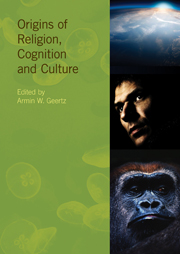Book contents
- Frontmatter
- Contents
- Contributors
- Introduction
- Part I EVOLUTIONARY SCENARIOS
- 1 Whence religion? How the brain constructs the world and what this might tell us about the origins of religion, cognition and culture
- 2 Why “costly signalling” models of religion require cognitive psychology
- 3 The prestige of the gods: evolutionary continuities in the formation of sacred objects
- 4 The evolutionary dynamics of religious systems: laying the foundations of a network model
- 5 Art as a human universal: an adaptationist view
- 6 The significance of the natural experience of a “non-natural” world to the question of the origin of religion
- 7 Religion and the emergence of human imagination
- 8 The origins of religion, cognition and culture: the bowerbird syndrome
- 9 The will to sacrifice: sharing and sociality in humans, apes and monkeys
- 10 Apetales: exploring the deep roots of religious cognition
- Part II COGNITIVE THEORIES
- Index
1 - Whence religion? How the brain constructs the world and what this might tell us about the origins of religion, cognition and culture
from Part I - EVOLUTIONARY SCENARIOS
- Frontmatter
- Contents
- Contributors
- Introduction
- Part I EVOLUTIONARY SCENARIOS
- 1 Whence religion? How the brain constructs the world and what this might tell us about the origins of religion, cognition and culture
- 2 Why “costly signalling” models of religion require cognitive psychology
- 3 The prestige of the gods: evolutionary continuities in the formation of sacred objects
- 4 The evolutionary dynamics of religious systems: laying the foundations of a network model
- 5 Art as a human universal: an adaptationist view
- 6 The significance of the natural experience of a “non-natural” world to the question of the origin of religion
- 7 Religion and the emergence of human imagination
- 8 The origins of religion, cognition and culture: the bowerbird syndrome
- 9 The will to sacrifice: sharing and sociality in humans, apes and monkeys
- 10 Apetales: exploring the deep roots of religious cognition
- Part II COGNITIVE THEORIES
- Index
Summary
Origins of religion
In cognitive theories of the origins of religion, it is held that religious thought and behaviour are by-products of or even parasitic on more basic cognitive processes. Religion is not an evolutionary adaptation, genetic or cultural, even though it may occasionally help individuals and groups. In the following, I take issue with this approach. It must be emphasized, however, that the work of cognitive scientists of religion, such as Pascal Boyer and Scott Atran, has raised issues and questions that have led to useful hypotheses, experiments and insights on religion and human cognition. For instance, they agreed that the age-old assumption that religion produces morals and values is neither the only, nor the most parsimonious, hypothesis for religion. According to Boyer and Atran, humans are more or less born with, or at least quite early on have, default moral sensibilities (cf. Pyysiäinen & Hauser 2010). The evidence is strong that the origins of such sensibilities are to be found in basic social cognition.
Boyer and Atran presented similar claims, which are useful to think with, about what religion is not. Boyer summarized what religion is not in four points:
religion provides explanations;
religion provides comfort;
religion provides social order; and
religion is a cognitive illusion (Boyer 2001: 5).
Even though Boyer rejects these scenarios for the origin of religion, he claims that they are not that bad (ibid.: 6), rather they point to phenomena that need explaining.
- Type
- Chapter
- Information
- Origins of Religion, Cognition and Culture , pp. 17 - 70Publisher: Acumen PublishingPrint publication year: 2013



